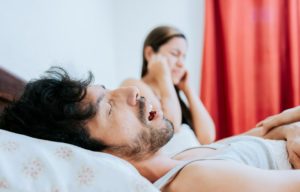
If you have sleep apnea, you likely understand just how much your symptoms can impact your day-to-day life. From chronic fatigue to difficulty focusing throughout the day, there’s an entire spectrum of effects that your condition can have on you. Read on to learn about five factors that can lead to worsening sleep apnea symptoms so you can reclaim your life by minimizing the effects of your condition.
Taking Certain Medications
Did you know that certain medications can make your sleep apnea symptoms even worse than they already are? Valium or Xanax, painkillers (specifically opioids), sleep aids, and muscle relaxers can all cause your throat muscles to relax, obstructing your upper airway and leading to obstructive sleep apnea. If you are taking these medications and have noticed them impacting your ability to get quality rest, consulting with your doctor or sleep specialist is a great first step to controlling your symptoms.
Sleeping on Your Back
An estimated 10 percent of adults sleep on their back, making it one of the top three most common sleep positions! However, sleeping on your back can also exacerbate sleep apnea symptoms. The extra weight and pressure on your airways can lead to more frequent apneas (or episodes) throughout the night, minimizing oxygen flow as you sleep. You can try sleeping on your side, or if you naturally roll onto your back throughout the night, you can use a pillow to keep your body positioned more to the side.
Alcohol Consumption
Alcohol acts as a muscle relaxant, which means that when you drink before bed, your throat muscles and tongue can cause further obstruction of your airway, leading to worse snoring as well. To keep this from happening, avoid drinking alcohol at least a few hours before bed.
Pre-Existing Medical Conditions
There are several existing medical conditions that have been associated with sleep apnea, including:
- Heart disease
- Chronic pain
- GERD (Gastroesophageal Reflux Disease)
- Type II diabetes
- High blood pressure
If you have one or more of these conditions and have noticed that you’re also experiencing symptoms of sleep apnea, speak with your doctor about how you can get these concerns under control.
Not Using CPAP Machine Correctly
CPAP devices are often prescribed for those with obstructive sleep apnea. Their purpose, when utilized correctly, is to open the airway as you rest by continuously pumping air so they remain unobstructed. However, when used incorrectly, you may not feel the relieving effects of your treatment. If you’re unsure of whether your CPAP machine is working and concerned about whether you’re using it correctly, speak with your sleep specialist!
About the Practice
At Ponte Vedra Complete Dentistry, we offer the expertise of two highly-trained dentists, Dr. Kristopher Harth and Dr. Eric Townsend. Their combined experience and knowledge allow our team to provide a comprehensive menu of services, ranging from basic preventive checkups and cleanings to more specialized sleep apnea treatment. For questions or to schedule a consultation, visit our website or call 904-285-7711.



